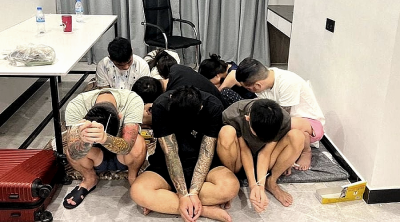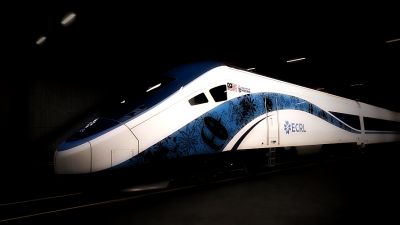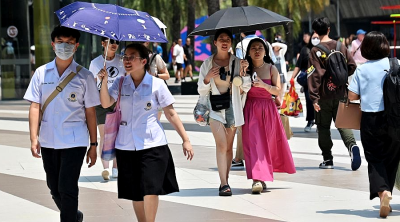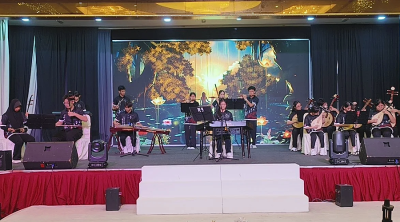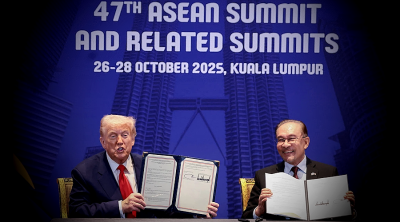President Joko “Jokowi” Widodo and his top ministers have repeatedly said China will be given the contract to build the Jakarta-Surabaya high-speed railway, citing their satisfaction with its construction of the Jakarta-Bandung line, even though the latter project will be completed four years behind schedule and has seen costs skyrocket as a result of a poor feasibility study and messy contract formulation.
China will be Indonesia’s most important trading partner and investor for many years to come, and the two have enjoyed amicable relations despite a few incidents in the North Natuna Sea, which China has sought to claim as a traditional fishing ground.
But should Jokowi rush to realize the 800-kilometer high-speed railway through direct appointment before he leaves office in October of next year just for the sake of Indonesia-China bilateral relations and his ambition?
It will be much more productive for him to focus on the construction of the new capital city, Nusantara.
I am afraid the President is taking the railway project too personally, just to show that he is right and others are wrong.
Whoever succeeds Jokowi, I am pretty sure the new capital project will continue, although perhaps not as fast as Jokowi might expect.
How about the Jakarta-Surabaya railway project? The new president will think twice.
If you ask laypeople about the new railway project, many oppose the direct appointment mechanism because they believe the outcome will be disastrous, as in the case of the Jakarta-Bandung railway.
As the old proverb goes, even a donkey won’t fall into the same hole twice. Smarting from the Jakarta-Bandung train project, the government should open international bidding for the Jakarta-Surabaya high-speed railway.
For such a strategic project, fairness and transparency matter. Even if China wins the tender, it will be fair for everyone.
The bidding process may take at least one year. Hopefully, the contractor of the project will be announced before October 2024.
The national project will not give Jokowi an extra headache before the end of his term.
The Jakarta-Bandung railway will continue haunting Jokowi when he is no longer in power, not because the train has failed to live up to people’s expectations but because of the politicking behind the project.
China won the contract because of its proven technology. I enjoyed China’s railway service a few years ago when I rode a bullet train from Shanghai to Beijing.
There was no difference at all from when using the Japanese Shinkansen train. Both are technologically highly sophisticated.
But this is not just about technology.
Let me share my recent conversation with a young government official who obtained his graduate and postgraduate degrees and is now pursuing his doctorate at a prestigious university in China.
According to the official, Indonesia should be very certain from the beginning of any business negotiations that we have mastered Chinese law and systems and we know how to communicate with the Chinese government when a violation of the law occurs.
“Chinese people are law-abiding citizens because they know the consequences when they breach the rules,” he said.
He said the Chinese government had to act with an iron hand because of the huge population.
From the conversation, I concluded that Indonesia had not prepared enough for the negotiation of the Jakarta-Bandung high-speed rail contract in 2015.
There were many loopholes in the contract, I think.
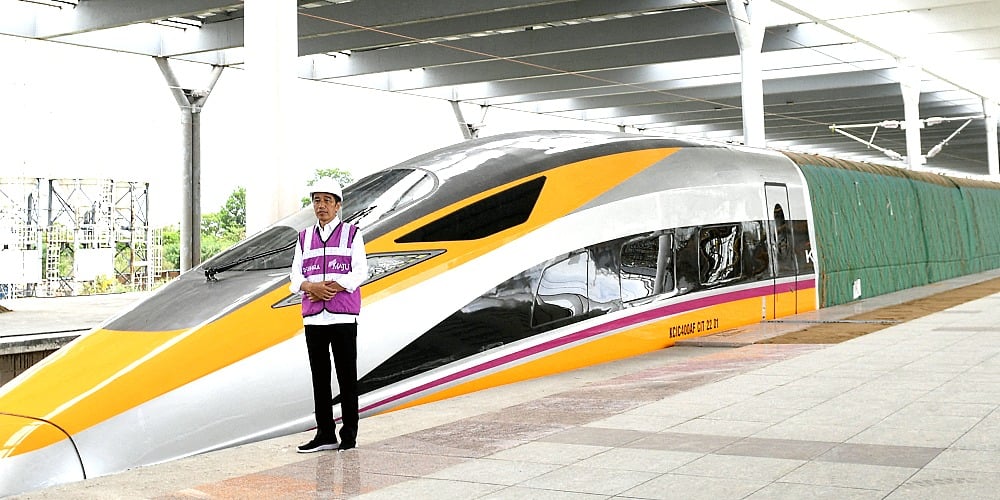
President Jokowi dropped Japan’s offer even though it had concluded a comprehensive feasibility study with a full financing package.
Jokowi was unhappy because Japan demanded a government guarantee, which was its long-standing position.
At the time, Jokowi chose China to show his foreign policy trademark.
In 2014, Japan offered to cover 75 percent of the cost in long-term and soft loans. The project was estimated to cost US$6.2 billion. Its interest rate was just 0.1 percent, and the loan term was 40 years. Repayment would start 11 years after the railway started operation.
Then-Japanese prime minister Shinzo Abe could not hide his disappointment when Jokowi decided to choose China.
Jokowi’s choice provoked nationwide anger in Japan. Then, the President offered a consolation prize by promising to let Japan conduct a feasibility study on the Jakarta-Surabaya train project.
“Is Jakarta-Surabaya still so attractive commercially?” a Japanese friend responded when I asked whether Japan was still interested in the railway project.
He knows much about the project, so I can conclude that Japan does not want to face another act of betrayal.
China offered a business-to-business scheme, but in the end, it required a government guarantee.
Worse, China did not have a meaningful feasibility study at that time.
The results? The Jakarta-Bandung project has been delayed four years from its original 2019 schedule.
Miscalculations and other problems caused costs to run 20 percent past the original $6.07 billion budget.
The Jakarta-Surabaya train is expected to shorten the travel time between the country’s two largest cities from 10-13 hours to four hours.
It is an extension of the Jakarta-Bandung line. The route will be Jakarta-Karawang-Bandung-Kertajati-Purwokerto-Yogykarta-Surakarta-Madiun-Surabaya.
In January this year, Coordinating Maritime Affairs and Investment Minister Luhut Pandjaitan said President Jokowi wanted China to work on the high-speed railway extension.
The government has insisted that the Jakarta-Bandung service should start in August of this year.
However, it has not been fully prepared for operation.
A Reuters report citing an internal document said the Transportation Ministry and three consultants had suggested pushing back the commercial operations date to January 2024 because of unfinished work.
The government, on the other hand, wants to inaugurate the line around the Asean Summit in Jakarta in September, which will be attended by foreign leaders from outside the bloc as well, including China.
Jokowi may also announce the direct appointment of China as the contractor for the Jakarta-Surabaya railway project.
When I asked about the scheduled visit of Chinese President Xi Jinping to attend the second Asean Summit of the year in September, Chinese Ambassador to Asean Hou Yanqi said Premier Li Qiang would represent China instead.
Before going ahead with the Jakarta-Surabaya railway project, Jokowi must calculate the long-term impact of his decision, including public scrutiny when he is no longer in power.
ADVERTISEMENT
ADVERTISEMENT






